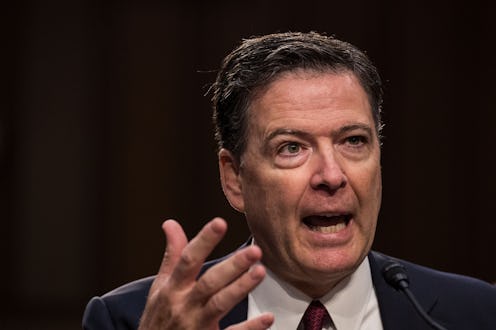News
James Comey Says There’s Some Evidence Trump Obstructed Justice — Here It Is

Former FBI director James Comey's interview with George Stephanopoulos led to a number of pretty salacious claims coming out into the public view. Comey was one of the nation's top law enforcement officials, though, so perhaps even more important than the juicy details of his conversations with Donald Trump was the fact that Comey said there's possibly evidence of Trump obstructing justice.
Ever since Trump fired Comey and then said publicly that he did it because of the Russia investigation, news has been trickling out about potential obstruction of justice charges facing the president. There's a lot of discussion about how solid of an obstruction of justice case Mueller has, though, so it's worth listening to what a former high ranking official like Comey has to say about it.
Comey argues that the evidence of Trump possibly obstructing justice comes from the now infamous moment when Comey claims Trump asked him to let the investigation of former national security advisor Michael Flynn go. Trump's team denied that the president ever made that request, so as with so many claims that Comey has made, it's a battle of one man's word versus the other's.
In Comey's view, though, Trump's comment could serve as a piece of evidence in an obstruction case because it would have amounted to a president trying to end an FBI investigation.
"It's certainly some evidence of obstruction of justice," Comey told Stephanopoulos. "It would depend and — and I'm just a witness in this case, not the investigator or prosecutor, it would depend upon other things that reflected on his intent."
With that last part of the comment, Comey pinpoints exactly the issue that numerous other experts have brought up: intent. Obstructing justice is only a major crime if — and only if — it was carried out with "corrupt" intent. So, Mueller would have to build a case that Trump knowingly and purposefully obstructed justice — and not just that Trump did something that qualifies as obstruction of justice but didn't fully recognize what he was doing. This is why Comey had to make it clear that that piece of evidence alone — while damning in its own way — does not build an entire obstruction of justice case.
Asking Comey to drop the investigation with Flynn isn't the only moment in Trump's tenure in office that could lead to obstruction charges, however. Mueller could also be looking at how Trump asked attorney general Jeff Sessions not to recuse himself from the Russia investigation, Trump's decision to fire Comey (and aforementioned public admission that the purpose was to lift the Russia investigation), and the fact that Trump actually dictated a misleading statement that Donald Trump Jr. released about his July 2016 meeting with a Kremlin-connected lawyer, which the Washington Post reported on in July 2017.
While all of these pieces of evidence still leave the question of intent open to various degrees, they do amount to what many experts see as a strong case. This doesn't mean that you should expect to see impeachment proceedings beginning overnight, though. The intent issue is a big one, as is the question of precedent. While both Nixon and Clinton faced impeachment articles that included obstruction of justice (though Nixon resigned before he could actually be impeached), the charges against them — among them destroying evidence and tampering with witnesses — were much more clear cut than the missteps that Trump may have made.
Trump's lawyers have also argued that Trump, as president, is above charges of obstruction of justice. Vox reports that most legal experts don't exactly agree with that claim, but there are still legal questions about what the president, as the top executive officer in the country, can legally do in cases like these. Firing Comey, for example, was something that Trump had the power to do — even if he definitely broke a longstanding norm in doing so.
In short, keep following this case, because it's still very much an open question — and Comey's comments could turn out to be very important, if prosecutors find evidence that his word is stronger than Trump's.